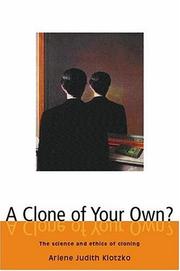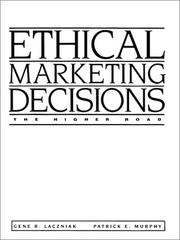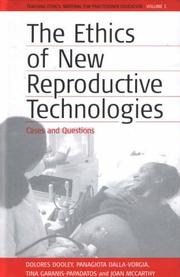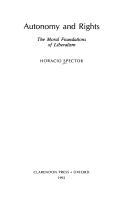| Listing 1 - 10 of 88 | << page >> |
Sort by
|

ISBN: 0192803093 Year: 2004 Publisher: Oxford Oxford university press
Abstract | Keywords | Export | Availability | Bookmark
 Loading...
Loading...Choose an application
- Reference Manager
- EndNote
- RefWorks (Direct export to RefWorks)
A Clone of Your Own? describes the world of possibilities with regard to human cloning. It explains that the technology to create clones of living beings already exists, inaugurated in 1996 by Dolly the sheep, and shows why the prospect of human cloning triggers hopes and fears, forcing us to ponder what it means to be human. Our fascination with cloning is about much more than science and its extraordinary medical implications. In riveting prose, full of allusions to literature, psychology, art, music, and the cinema, Klotzko shows why the prospect of human cloning triggers our dearest hopes and especially our darkest fears, forcing us to ponder anew what it means to be human. And what it would be like to have 'a clone of your own'. Someday soon (if it hasn't happened in secret already), a human will be cloned, and mankind will embark on a scientific and moral journey whose destination cannot be foretold. In A Clone of Your Own?, Arlene Judith Klotzko describes the new world of possibilities that can be glimpsed over the horizon. In a lucid and engaging narrative, she explains that the technology to create clones of living beings already exists, inaugurated in 1996 by Dolly the sheep, the first mammal cloned from a single adult cell. Dolly was the culmination of a long scientific quest to understand the puzzle of our development from one cell into a complex organism - the outcome of a ' fantastic experiment' envisioned six decades before her birth. Scientists have since cloned mice, cows, goats, pigs, rabbits, horses, rats, a cat and a mule. Using the same laboratory tools and techniques, other researchers are trying to grow embryos, cloned from a single cell of a human being. Their goal is not to make copies of existing people, but to derive stem cells, the infinitely malleable raw material from which they hope to design therapies for currently untreatable diseases and the afflictions of old age.

ISBN: 0060100923 Year: 1974 Publisher: New York Harper & Row
Abstract | Keywords | Export | Availability | Bookmark
 Loading...
Loading...Choose an application
- Reference Manager
- EndNote
- RefWorks (Direct export to RefWorks)
Hunting --- Wildlife conservation --- Moral and ethical aspects
Dissertation
ISBN: 9517651031 Year: 2002 Publisher: Åbo Åbo akademis förlag
Abstract | Keywords | Export | Availability | Bookmark
 Loading...
Loading...Choose an application
- Reference Manager
- EndNote
- RefWorks (Direct export to RefWorks)
Image
Abstract | Keywords | Export | Availability | Bookmark
 Loading...
Loading...Choose an application
- Reference Manager
- EndNote
- RefWorks (Direct export to RefWorks)
Filial piety --- Moral and ethical aspects --- Netherlandish
Book
ISSN: 16393694 ISBN: 2283019354 9782283019351 Year: 2003 Publisher: Paris : Buchet-Chastel,
Abstract | Keywords | Export | Availability | Bookmark
 Loading...
Loading...Choose an application
- Reference Manager
- EndNote
- RefWorks (Direct export to RefWorks)
Alors que l'érotisme met en scène le mystère du sujet et de la sexualité, la pornographie flatte le voyeurisme et livre au regard un corps morcelé, privé de visage. Plaçant le spectateur dans le registre de la sensation et de la consommation, elle efface le désir lui-même. Elle conduit à l'asservissement et à la disparition de l'humanité de l'homme. Loin d'être un rappel à l'ordre, le livre de Michela Marzano permet de distinguer les enjeux éthiques qui sous-tendent les représentations du corps humain, et offre un plaidoyer pour la liberté et la responsabilité, afin que l'autre demeure celui dont la rencontre nous conduit au meilleur de nous-mêmes, voire au-delà.
Pornography --- Pornographie --- Moral and ethical aspects --- Social aspects --- Aspect moral --- Aspect social --- Moral and ethical aspects.

ISBN: 0205136273 9780205136278 Year: 1993 Publisher: Boston (Mass.) : Allyn and Bacon,
Abstract | Keywords | Export | Availability | Bookmark
 Loading...
Loading...Choose an application
- Reference Manager
- EndNote
- RefWorks (Direct export to RefWorks)
Business ethics --- Marketing --- Moral and ethical aspects --- Marketing - Moral and ethical aspects
Book
ISBN: 9171390316 Year: 1991 Publisher: Stockholm Symposion
Abstract | Keywords | Export | Availability | Bookmark
 Loading...
Loading...Choose an application
- Reference Manager
- EndNote
- RefWorks (Direct export to RefWorks)
Technology --- Moral and ethical aspects. --- Technology and ethics --- Moral and ethical aspects
Book
ISBN: 9780300235081 0300235089 Year: 2019 Publisher: New Haven,
Abstract | Keywords | Export | Availability | Bookmark
 Loading...
Loading...Choose an application
- Reference Manager
- EndNote
- RefWorks (Direct export to RefWorks)
An insightful and passionately written book explaining why a return to Enlightenment ideals is good for the world. The greatest challenges facing humankind, according to Deirdre McCloskey, are poverty and tyranny, both of which hold people back. Arguing for a return to true liberal values, this engaging and accessible book develops, defends, and demonstrates how embracing the ideas first espoused by eighteenth-century philosophers like Locke, Smith, Voltaire, and Wollstonecraft is good for everyone. With her trademark wit and deep understanding, McCloskey shows how the adoption of Enlightenment ideals of liberalism has propelled the freedom and prosperity that define the quality of a full life. In her view, liberalism leads to equality, but equality does not necessarily lead to liberalism-and the fixation of the left on inequality is counterproductive. Liberalism is an optimistic philosophy that depends on the power of rhetoric rather than arms and on ethics, free speech, and facts for us to thrive.
Liberalism --- Capitalism --- Economic history --- Liberty --- Moral and ethical aspects --- Economic order --- Economic history - Moral and ethical aspects --- Liberty - Moral and ethical aspects

ISBN: 1571815996 1800733593 Year: 2003 Publisher: New York Berghahn
Abstract | Keywords | Export | Availability | Bookmark
 Loading...
Loading...Choose an application
- Reference Manager
- EndNote
- RefWorks (Direct export to RefWorks)
The new reproductive technologies (NRTs) have given rise to new ethical questions that are widely debated. This book, the outcome of a European Union-wide collaborative process, draws on the experience and expertise of ethicists, lawyers, and clinical practitioners and focuses on some of the "burning issues" in different European countries. These include: donor insemination; surrogacy; preimplantation genetic diagnosis; embryo research; access to IVF treatment; and parental, professional and social responsibility. Familiar notions such as quality of life, parenthood, mothering, responsibility and personal identity surface at many points throughout the book and are refashioned to accommodate new questions.This book introduces and probes ethical questions and challenges in a hands-on way by working through relevant case studies with key commentaries and activities. It engages the reader directly in ethical reasoning and decision-making and provides clear explanations, insightful commentaries and informed debate on NRTs.
Human reproductive technology --- Infertility --- Moral and ethical aspects --- Treatment

ISBN: 0198239211 9780198239215 Year: 1992 Publisher: Oxford,
Abstract | Keywords | Export | Availability | Bookmark
 Loading...
Loading...Choose an application
- Reference Manager
- EndNote
- RefWorks (Direct export to RefWorks)
Political philosophy. Social philosophy --- General ethics --- Liberalism --- -Liberalism --- -Liberal egalitarianism --- Liberty --- Political science --- Social sciences --- Moral and ethical aspects --- Philosophy --- -Moral and ethical aspects --- Liberalism - Moral and ethical aspects. --- Liberalism - Philosophy.
| Listing 1 - 10 of 88 | << page >> |
Sort by
|

 Search
Search Feedback
Feedback About UniCat
About UniCat  Help
Help News
News